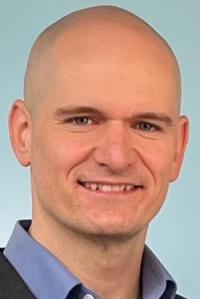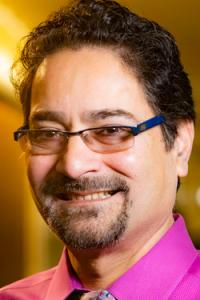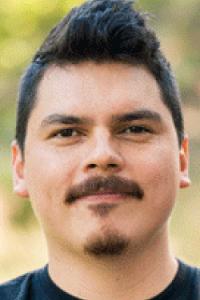IN THIS COLUMN
- David Olson, College of Letters and Science and School of Medicine
- Prasad Naik, Graduate School of Management
- Bernardo “Bernie” Bastien-Olvera, College of Agricultural and Environmental Sciences
The Mahoney Institute for Neurosciences at the University of Pennsylvania recently presented its 2023 Rising Star Award to David Olson, founding director of the UC Davis Institute for Psychedelics and Neurotherapeutics.

The institute has given a Rising Star Award annually since 2018, in categories such as addiction research and neurodegenerative research, and, in 2023, for the understanding of the neurobiology of psychedelics.
Olson received his award, including a $10,000 honorarium, at the institute’s 38th annual retreat and symposium in April. He was also on the symposium program, making a presentation.
“This award is really a reflection of the incredible creativity and passion of the many students and researchers at UC Davis who are pushing the field of psychedelic science in new and exciting directions,” said Olson, associate professor in the Department of Chemistry, College of Letters and Science, and the Department of Biochemistry and Molecular Medicine, School of Medicine.
In 2018, Olson and colleagues demonstrated that psychedelics — like DMT, LSD and psilocin — promote neuroplasticity, highlighting the ability of these compounds to repair neural circuits affected by myriad mental health and neurodegenerative diseases.
In follow-up studies, the team decoupled the therapeutic effects of psychedelics from their hallucinogenic properties. Eventually, they engineered the first nonhallucinogenic version of a psychedelic compound with therapeutic potential and developed a cellular assay to determine a compound’s hallucinogenic potential.
Building on this momentum to advance brain health, UC Davis launched the Institute for Psychedelics and Neurotherapeutics in early 2023. The institute is funded by an approximately $5 million from the College of Letters and Science and the School of Medicine, the Office of Research and the Office of the Provost.
Read more in this article by Greg Watry, content strategist and writer in marketing and communications, College of Letters and Science.
Professor Prasad Naik of the Graduate School of Management has been named the recipient of the Medill School’s second annual Don Schultz Award honoring excellence in teaching the principles of integrated marketing communications and bridging the gap between the academic and commercial arenas.

The school at Northwestern University will present the award in a May 25 ceremony.
The award is named after the longtime Medill professor who played a pivotal role in creating the field of integrated marketing communications and establishing Medill’s department in the field in the early 1990s. The Medill School of Journalism, as it was originally named, changed its name to the Medill School of Journalism, Media and Integrated Marketing Communications in 2011.
Schultz died in 2020, and Medill established the award in 2022, describing it as an international award for marketing professors or professionals. A committee of faculty and industry experts makes the selection. The award comes with a $5,000 prize.
Naik’s research offers answers to questions such as how much should companies spend on marketing, how to split the budget across multiple media channels, and how to manage livestream salespeople’s performance. He has published more than 50 journal articles.
Bernardo “Bernie” Bastien-Olvera, a recent Ph.D. graduate from the Geography Graduate Group, is this year’s recipient of the Kinsella Memorial Prize for his doctoral research on the effects of climate-driven impacts on global ecosystems and the influence on human well-being.

The award recognizes a student whose Ph.D. dissertation is of high quality, original, involves more than one field of study and aligns with the mission of the College of Agricultural and Environmental Sciences. The $3,500 prize was established to honor the late John Kinsella, a former CA&ES dean and internationally recognized food chemist.
“I feel so honored to be the recipient of this award,” Bastien-Olvera said. “It’s amazing.”
Bastien-Olvera’s dissertation, “Climate Change Impacts on Natural Capital: Consequences for Human Well-Being and Macro-Economic Growth,” included creating a model of the interactions between climate, economics and ecosystems to estimate metrics such as the social cost of carbon, which is the cost society has to bear created by 1 ton of carbon dioxide emissions.
Frances C. Moore, associate professor of environmental science and policy, was Bastien-Olvera’s advisor and praised his interdisciplinary work that “directly addresses important policy questions” around climate change costs and biodiversity policy.
“During his time at Davis, Bernie excelled in every way – as a student, scholar, student leader – while completing highly-original research spanning multiple disciplines,” Moore wrote in a nomination letter.
By the time he completed his Ph.D., Bastien-Olvera had three peer-reviewed published papers related to this doctoral research, including one published in the journal Nature Sustainability. He also holds a master's degree in climate change from University College London and a bachelor's degree in earth science from the National Autonomous University of Mexico.
Bastien-Olvera is now serving as an institutional postdoctoral fellow at the Scripps Institution of Oceanography at the University of California, San Diego, where he is studying climate change effects on ocean-based economies and ecosystem services.
Read more about Bastien-Olvera in this article by Tiffany Dobbyn, communications specialist, College of Agricultural and Environmental Sciences.
Dateline UC Davis welcomes news of faculty and staff awards, for publication in Laurels. Send information to dateline@ucdavis.edu.
Media Resources
Dateline Staff: Dave Jones, editor, 530-752-6556, dateline@ucdavis.edu; Cody Kitaura, News and Media Relations specialist, 530-752-1932, kitaura@ucdavis.edu.
